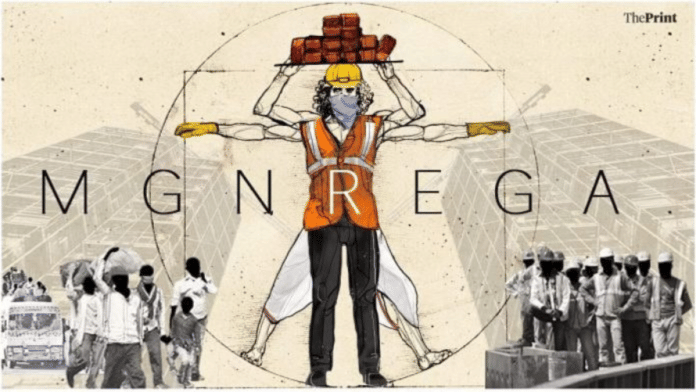New Delhi: The Central Employment Guarantee Council (CEGC), a crucial monitoring provision mandated under the Mahatma Gandhi National Rural Employment Guarantee Act (MGNREGA) of 2005, has not held any review meetings for nearly the past four years due to delays in appointments of non-officio or civil society members, ThePrint has learnt.
The last meeting was held in February 2021 and chaired by the then rural development minister Narendra Singh Tomar, according to the Union Ministry of Rural Development.
According to two senior ministry officials, the ministry is now in the process of appointing civil society members to the council.
Proposed under Section 10 (1) of the MGNREGA, the council is crucial for the routine monitoring and evaluation of the implementation of the rural employment guarantee scheme.
Chaired by the rural development minister, the council is meant to have 15 officials from central and state governments and 12 non-officio members representing Panchayati Raj institutions, workers’ organisations, and disadvantaged groups.
Emphasising the need for the council, Chakradhar Buddha, senior researcher at LibTech India, a non-profit organisation of experts working on MGNREGA-related matters, told ThePrint, “The failure to constitute the Central Employment Guarantee Council not only violates the MGNREGA but also silences a critical platform for workers to voice their concerns. The council is essential to safeguarding workers’ interests.”
The council is also tasked with advising the government on matters related to MGNREGA implementation, preparing annual reports on how the implementation is going for the central government to table the reports in Parliament, and disseminating information about MGNREGA, among other functions.
Social activist Nikhil Dey, the co-founder of the Mazdoor Kisan Shakti Sangathan (MKSS) and member of the NREGA Sangharsh Morcha, said that the council does not have many powers as it is just an advisory and, to some extent, a monitoring body. However, the council, he said, gave MGNREGA workers’ representatives, civil society members and others a platform to raise issues affecting the implementation of the rural employment guarantee scheme.
“By not constituting the council, the government is violating the law and Supreme Court directives but, more importantly, losing a set of allies and experts for MGNREGA, thereby actually harming itself,” Dey said.
Despite repeated efforts to contact the ministry through emails and WhatsApp for comments on this matter, ThePrint has, so far, not received a response.
A senior ministry official, requesting anonymity, said, “The council exists, but the meetings could not happen as the council did not have the required number of members to meet the quorum. The process to appoint new non-officio members is ongoing.”
Crucial role in the past, urgently needed now
In the case of the first council, set up in 2006, the government consulted the members on several crucial issues, said civil society members.
Dey said, “It is an independent statutory body, which has by now been consulted on several crucial issues, such as payment of minimum wages (the first council), fighting corruption, delay in timely payment of wages, worksite management, categories of permissible works, among other topics in the past.”
The Centre has introduced several key reforms, such as an Aadhaar-Based Payment System (ABPS) for settling wages and an online attendance system (National Mobile Monitoring System)—two crucial technological interventions made mandatory in the past two years. However, civil society members say the council could have played a significant role in addressing the workers’ issues.
Buddha said that over 8.8 crore workers, facing problems with the new online attendance system and the ABPS for wage payments, have been deleted from the rolls in the past 2.5 years.
“While the government, considering a lack of complaints, contends that there are no issues, the reality is that the grievance redressal systems remain extremely weak and often discourage workers from coming forward. The council would offer workers the critical space needed to address these challenges directly,” said Buddha.
Moreover, Dey said there is a need to provide a permanent secretariat to the council. “There is also a need to set up a (small) permanent secretariat for the council so that the secretariat can take note of issues discussed, conclusions reached, and follow up on them between meetings.”
(Edited by Madhurita Goswami)
Also Read: How Centre’s SVAMITVA scheme is helping unlock economic potential of residential land in villages






